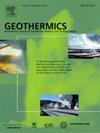通过分析非稳态解卷积获得的传递函数,对立柱井的井间回注进行实验评估
IF 3.5
2区 工程技术
Q3 ENERGY & FUELS
引用次数: 0
摘要
立柱井是一种半开环地热交换器,可通过对抽水和放水流量的战略控制实现高效的热交换率。与放水量相关的地下水排放管理仍然是一项挑战。一种解决方案是井间回注,它建议平衡立柱井之间的回流量。尽管尚未与传统的放流操作进行直接比较,但这种方法已被证明比完全平衡的再循环更有效。为了对井间回注性能进行可靠评估,我们对连接到真实建筑物的五口立柱井进行了长达 35 天的实验。使用非稳态解卷积算法评估了代表测试操作模式(完全再循环、放空和井间回注)的实验传递函数,并通过与 Monte-Carlo 实验中获得的数值传递函数进行比较,验证了它们与概念站点模型的匹配性。结果表明,在所测试的情况下,井间回注的热效率比完全再循环高 10%,尽管与典型的放空相比性能略有下降。这证实了井间回注在提高超临界水厂热交换效率方面的潜力,同时促进了地下水管理,避免了安装昂贵的注入设施。用于评估实验传递函数的方法也被认为是稳健的,因为它可以再现测量温度,均方根误差仅为 0.04 °C。最后,实验传递函数与蒙特卡洛实验的比较表明,概念模型的准确性还有待提高。本文章由计算机程序翻译,如有差异,请以英文原文为准。
Experimental assessment of inter-well reinjection in standing column wells by analysis of transfer functions obtained from non-stationary deconvolution
Standing column wells are semi-open-loop ground heat exchangers that can achieve highly efficient thermal exchange rates through the strategic control of the pumping and bleed flow rates. The management of groundwater discharges associated with bleed use remains a challenge. A solution is inter-well reinjection, which proposes to imbalance the return flow rates between the standing column wells. This approach has been shown to be more efficient than fully balanced recirculation, although a direct comparison with a conventional bleed operation has not yet been conducted. To provide a robust evaluation of inter-well reinjection performance, a 35-day-long experiment is conducted on five standing column wells connected to a real building. The experimental transfer functions representing the operating modes tested (full recirculation, bleed, and inter-well reinjection) are evaluated using a non-stationary deconvolution algorithm and their adequacy with the conceptual site model is verified by comparison with numerical transfer functions obtained in a Monte-Carlo experiment. The results indicate that inter-well reinjection leads to a 10% higher thermal efficiency in the scenarios tested compared to full recirculation, albeit with a slightly reduced performance compared to typical bleed use. This confirms the potential of inter-well reinjection for boosting the efficiency of thermal exchange in SCWs while facilitating groundwater management and avoiding the installation of costly injection facilities. The methodology used to evaluate the experimental transfer functions is also found to be robust, as it allowed the reproduction of the measured temperatures with a root mean square error of 0.04 . Lastly, comparison of the experimental transfer functions with the Monte-Carlo experiment suggests that the accuracy of the conceptual model could be improved.
求助全文
通过发布文献求助,成功后即可免费获取论文全文。
去求助
来源期刊

Geothermics
工程技术-地球科学综合
CiteScore
7.70
自引率
15.40%
发文量
237
审稿时长
4.5 months
期刊介绍:
Geothermics is an international journal devoted to the research and development of geothermal energy. The International Board of Editors of Geothermics, which comprises specialists in the various aspects of geothermal resources, exploration and development, guarantees the balanced, comprehensive view of scientific and technological developments in this promising energy field.
It promulgates the state of the art and science of geothermal energy, its exploration and exploitation through a regular exchange of information from all parts of the world. The journal publishes articles dealing with the theory, exploration techniques and all aspects of the utilization of geothermal resources. Geothermics serves as the scientific house, or exchange medium, through which the growing community of geothermal specialists can provide and receive information.
 求助内容:
求助内容: 应助结果提醒方式:
应助结果提醒方式:


